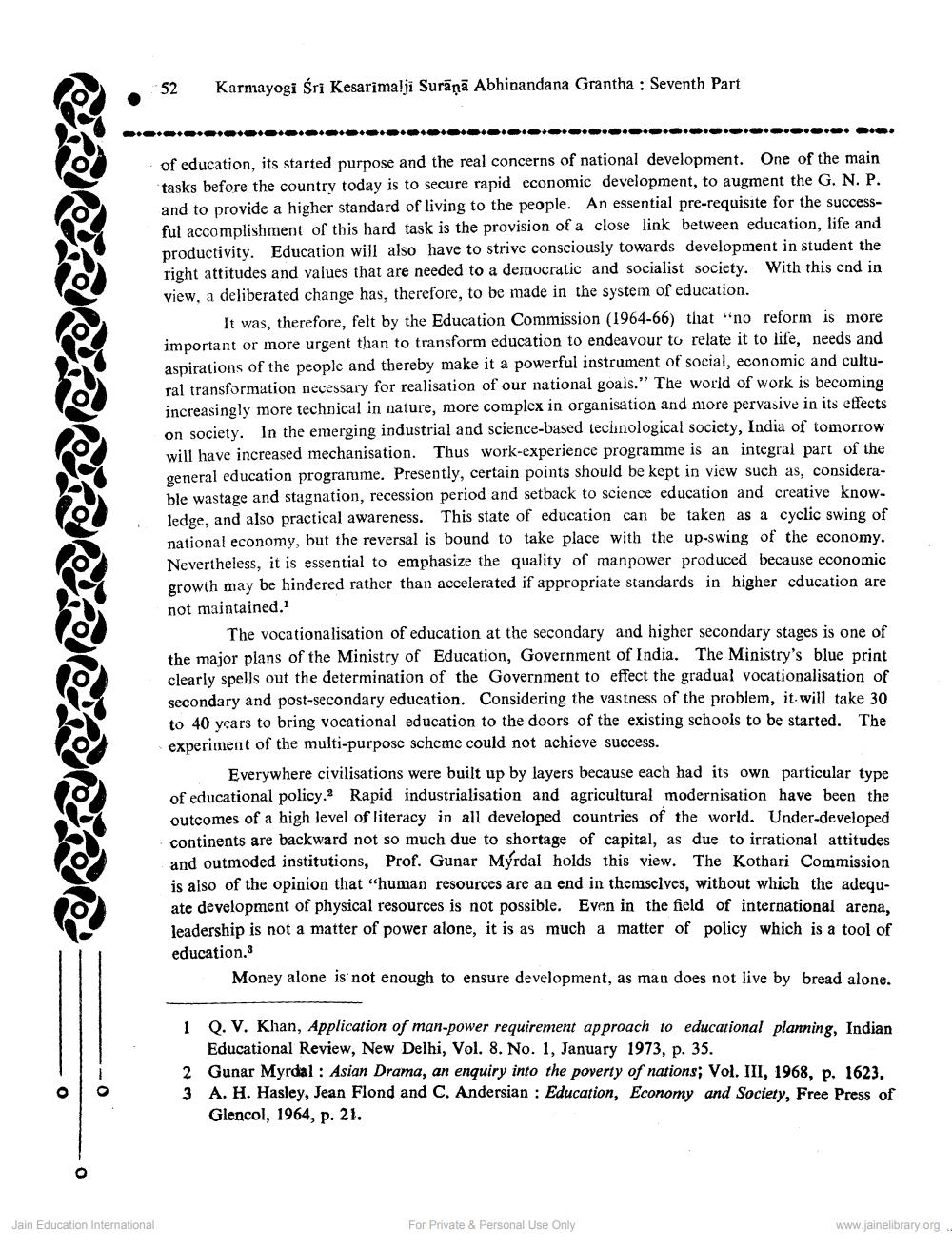Book Title: Education in economic perspective Author(s): B L Dhakad Publisher: Z_Kesarimalji_Surana_Abhinandan_Granth_012044.pdf View full book textPage 4
________________ 52 Karmayogi Śri Kesarimalji Surāņā Abhinandana Grantha : Seventh Part of education, its started purpose and the real concerns of national development. One of the main tasks before the country today is to secure rapid economic development, to augment the G. N. P. and to provide a higher standard of living to the people. An essential pre-requisite for the successful accomplishment of this hard task is the provision of a close link between education, life and productivity. Education will also have to strive consciously towards development in student the right attitudes and values that are needed to a democratic and socialist society. With this end in view, a deliberated change has, therefore, to be made in the system of education. It was, therefore, felt by the Education Commission (1964-66) that "no reform is more important or more urgent than to transform education to endeavour to relate it to life, needs and aspirations of the people and thereby make it a powerful instrument of social, economic and cultural transformation necessary for realisation of our national goals." The world of work is becoming increasingly more technical in nature, more complex in organisation and more pervasive in its effects on society. In the emerging industrial and science-based technological society, India of tomorrow will have increased mechanisation. Thus work-experience programme is an integral part of the general education programme. Presently, certain points should be kept in view such as, considerable wastage and stagnation, recession period and setback to science education and creative knowledge, and also practical awareness. This state of education can be taken as a cyclic swing of national economy, but the reversal is bound to take place with the up-swing of the economy. Nevertheless, it is essential to emphasize the quality of manpower produced because economic growth may be hindered rather than accelerated if appropriate standards in higher cducation are not maintained. The vocationalisation of education at the secondary and higher secondary stages is one of the major plans of the Ministry of Education, Government of India. The Ministry's blue print clearly spells out the determination of the Government to effect the gradual vocationalisation of secondary and post-secondary education. Considering the vastness of the problem, it will take 30 to 40 years to bring vocational education to the doors of the existing schools to be started. The experiment of the multi-purpose scheme could not achieve success. Everywhere civilisations were built up by layers because each had its own particular type of educational policy. Rapid industrialisation and agricultural modernisation have been the outcomes of a high level of literacy in all developed countries of the world. Under-developed continents are backward not so much due to shortage of capital, as due to irrational attitudes and outmoded institutions, Prof. Gunar Myrdal holds this view. The Kothari Commission is also of the opinion that "human resources are an end in themselves, without which the adequate development of physical resources is not possible. Even in the field of international arena, leadership is not a matter of power alone, it is as much a matter of policy which is a tool of education. Money alone is not enough to ensure development, as man does not live by bread alone. 1 Q. V. Khan, Application of man-power requirement approach to educational planning, Indian Educational Review, New Delhi, Vol. 8. No. 1, January 1973, p. 35. 2 Gunar Myrdal : Asian Drama, an enquiry into the poverty of nations; Vol. III, 1968, p. 1623. 3 A. H. Hasley, Jean Flond and C. Andersian : Education, Economy and Society, Free Press of Glencol, 1964, p. 21. Jain Education International For Private & Personal Use Only www.jainelibrary.orgPage Navigation
1 2 3 4 5 6 7 8
